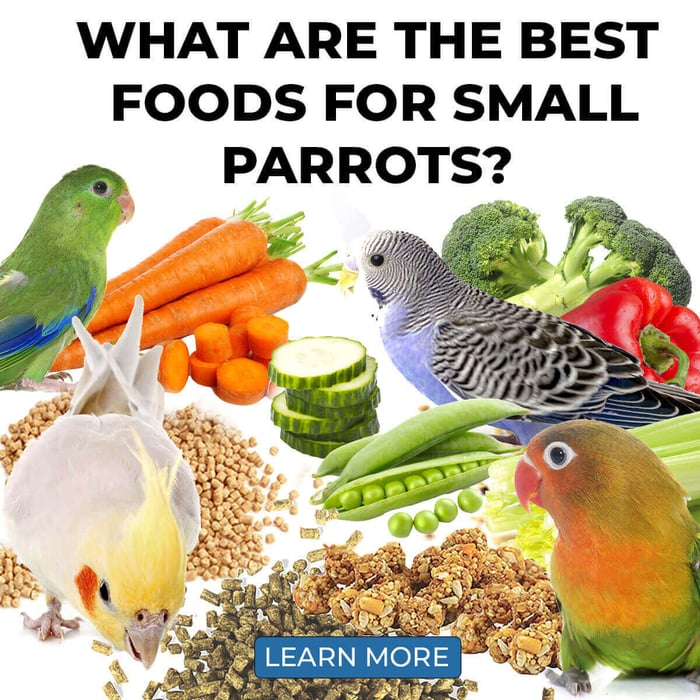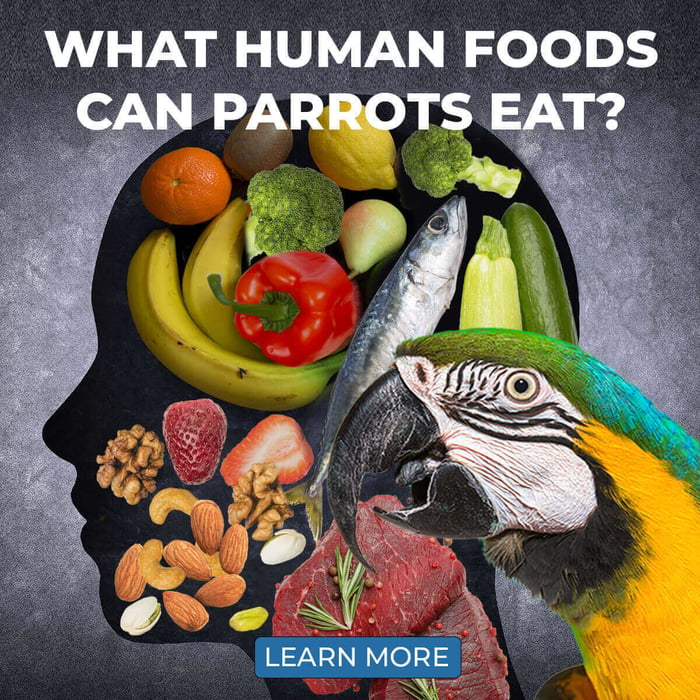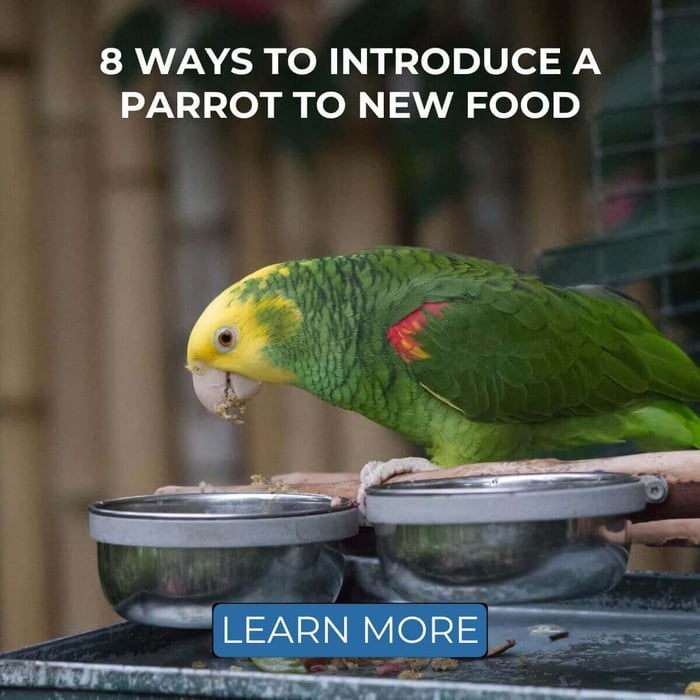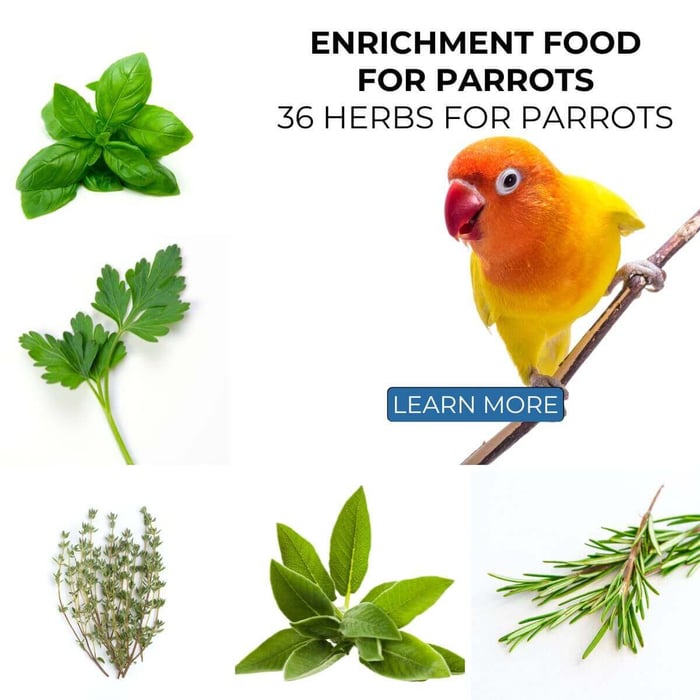What Do Parrots Eat? 5 Types of Parrot Food
If you're new to parrot keeping or trying to improve your parrot's diet, you might be wondering what types of parrot food are out there. What do parrots eat?
Let's go into 5 common types of parrot food that, together, can form the bulk of what your domestic feathered friend eats.
Parrot Pellets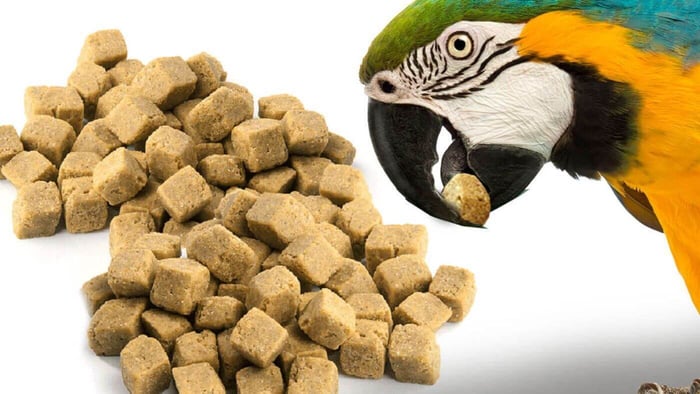
Here at Parrot Essentials, we've found parrot pellets to be the preferable staple food for our birds. Although seed mixes (which we'll discuss below) have long been the popular choice, they are unfortunately not always the most nutritious option.
Nutrient deficiency is a very common issue in pet parrots. In a bid to combat this, commercial parrot pellets were developed. They're a seed alternative that's lower in calories but higher in nutrients, making high-quality pellets (that don't contain excessive sugars or low-quality ingredients) a good staple option.
A diet consisting of 50-75% pellets, supplemented with the other foods on this list, should work well to avoid nutrient deficiency and keep your parrot healthy.
Tip: Not all parrots will be happy about being presented with pellets, especially if they're not used to unfamiliar foods. Check out our guide to converting your parrot to pellets to help make the transition a smooth one.
Parrot Seed Mix
Traditionally, parrot food seed mixes have always been the go-to food option for pet parrots. It is true that some parrot species, like budgies and cockatiels, almost exclusively consume seeds in the wild.
Despite the above, most sources don't recommend feeding seeds as a staple anymore. Domestic parrots don't need the large amounts of fat and calories that seeds provide, and we just can't offer the same variety that wild parrots would encounter.
Does that mean seed mixes are a no-go that you should banish from your home? We don't necessarily think so. Variety is the key to keeping any pet happy and healthy. Seeds can totally play a part in that. Just don't overdo it: try to make seeds no more than 10-15% of your bird's diet.
Tip: Avoid mixes that are heavy in very fatty seeds like sunflower seeds (those work better as training treats!).
Vegetables for Parrots
We're often asked whether parrots can eat various types of "human foods". And, in fact, they can! If you're making a salad for yourself, don't forget to offer a small portion to your parrot (before you add salt or other seasonings, of course).
Researchers found that Amazon parrots fed a mix of mostly pellets supplemented with fresh produce like vegetables (25%) ended up ingesting a good balance of nutrients (Brightsmith, 2012).
Generally, the more colourful the veggie, the better it will be for your parrot. Dark leafy greens like kale, (bell) peppers, (snap) peas, carrots, broccoli, and sweetcorn can all be fed raw. You can chop them up, but leaving them whole also works. Offering the whole vegetable helps to keep your parrot busy foraging for an extended period of time.
Note: Watery vegetables like iceberg lettuce, cucumber, and celery are fine but not very nutritionally dense. Spinach should be avoided in large quantities as it can inhibit proper calcium uptake. Mushrooms and avocados are harmful (see more harmful and toxic parrot foods).
You can mix different vegetables, fruits, sprouts and cooked grains into a healthy parrot meal.
Fruits for Parrots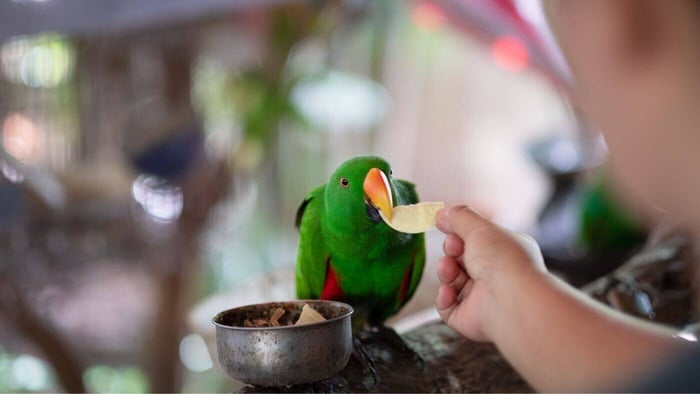
In the wild, many parrots eat a diet that's very high in fruits. However, like seeds, fruits shouldn't make up the main part of your domestic feathered friend's diet.
Although fruit is obviously a great source of nutrients, the cultivars of fruits that have been developed for humans are often high in sugars and calories. Compare this to what wild parrots are used to eating: wild fruit types, often not even ripe. Unfortunately, we, parrot owners, generally just don't have access to that. Most of us don't have Mauritia palms, Endocarpus bushes or Comocladia trees in our garden.
All this being said, it's absolutely fine to share some fruit with your parrot once in a while. They might love the crunchy texture of an apple or to demolish a strawberry (leave the leafy crown, please!). Just be sure to buy organic or give the fruit a good wash.
Sprouts for Parrots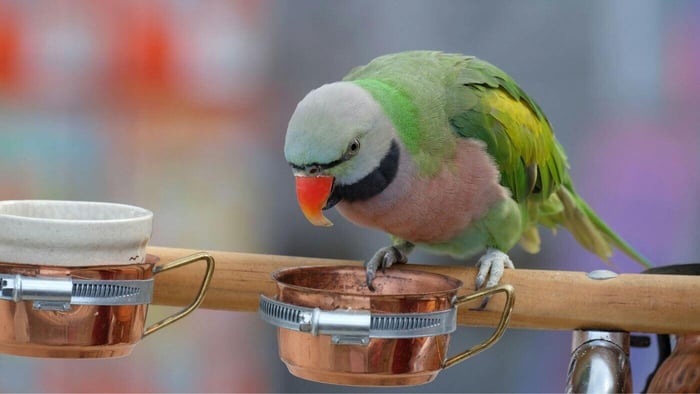
One great type of parrot food that's often overlooked entirely by less experienced parrot owners is sprouts. Sprouting is a perfect way to feed seeds, but it greatly increases their nutritional value with very little work!
You can actually sprout pretty much any standard parrot seed mix. Just place some seeds between two damp paper towels, pop the whole thing in a zip-lock bag and place this in a warm, light place. Even leaving the seeds in the bag just overnight already starts the sprouting process, but you can also leave them for a day or two until you see actual little green sprouts appearing.
Want to add even more variety? There are various sprouting mixes out there that are formulated for parrots and contain a range of different seeds, grains and legumes.
Conclusion
You hopefully now have an answer to the ultimate question What do parrots eat. Putting together a nutritious diet for your parrot that also stimulates foraging behaviour is not difficult at all. A high-quality pellet as a staple, supplemented with nutritious sprouts, vegetables and some fruits and seeds, works well for many species.
PS: Don't forget to look up the needs of your specific parrot species and tweak accordingly. African grey parrots, for example, are quite susceptible to calcium deficiencies. Eclectus parrots, meanwhile, have a longer digestive tract and should be fed a specialised Eclectus food.
Sources
FAQs
What should form the majority of my parrot's diet?
The bulk of your parrot's diet should consist of high-quality parrot pellets, which provide essential nutrients and are lower in calories compared to seeds. A diet of 50-75% pellets is recommended, supplemented with vegetables, fruits, and some seeds.
Can parrots eat seeds?
While seeds can be part of your parrot’s diet, they should not be the main component due to their high fat and calorie content. It's best to limit seed intake to about 10-15% of the diet and opt for a variety of seeds rather than just fatty ones like sunflower seeds.
Are there any vegetables that are harmful to parrots?
Yes, while many vegetables are beneficial, some should be avoided or limited. Spinach should be offered sparingly as it can inhibit calcium absorption. Completely avoid avocados and mushrooms, as these can be toxic to parrots.
How can I introduce pellets to a parrot's diet?
Introducing pellets to a diet where a parrot is used to seeds or other foods might require patience. Start by mixing a small amount of pellets with their usual food, gradually increasing the pellet proportion. Check out our detailed guide on converting your parrot to pellets for more tips.
What are the benefits of feeding sprouts to my parrot?
Sprouts are an excellent way to enhance the nutritional value of seeds. They are easy to prepare and can significantly boost the vitamin and mineral content of seeds, making them a healthy addition to your parrot’s diet.

